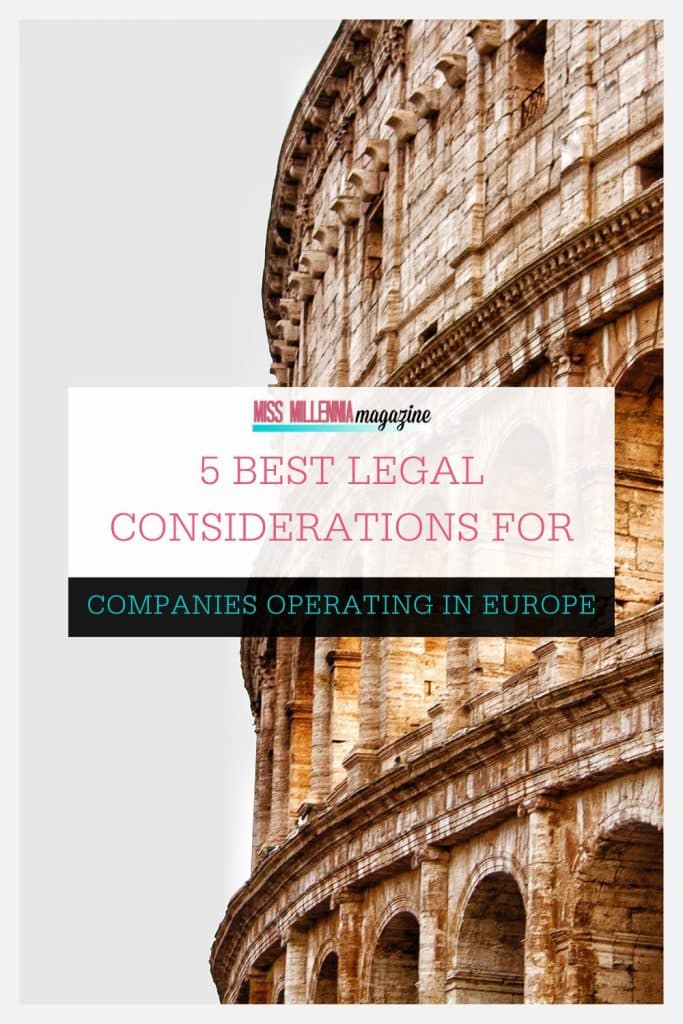5 Best Legal Considerations for Companies Operating in Europe
Businesses increasingly engage in international transactions to tap into new markets, access resources, and create growth. Thanks to its diverse economies, cultures, and legal systems, Europe offers immense opportunities for companies looking to expand their global footprint.
However, navigating the legal landscape of international business transactions in Europe requires careful consideration of various factors to ensure compliance, mitigate risks, and maximize success. Businesses must address several critical legal considerations to operate in Europe, and these considerations could be a barrier for companies operating on the continent.
Understanding the European Business Environment
Before delving into the legal considerations, it’s essential to understand the European business environment. Europe comprises diverse countries, each with its laws, regulations, and business practices. The European Union (EU), a political and economic union of 27 member states, has created a single market with harmonized regulations for goods, services, capital, and labor. Additionally, Europe is home to various international organizations, such as the European Free Trade Association (EFTA) and the European Economic Area (EEA), which further influence business activities in the region.
Legal Considerations for International Business Transactions in Europe
When engaging in international business transactions in Europe, companies must consider several legal factors to ensure compliance and mitigate risks. Here are some key considerations:
1. Choice of Law and Jurisdiction
Determining the applicable law and jurisdiction in cross-border transactions is crucial for resolving disputes and enforcing agreements. Companies must carefully consider choice-of-law and jurisdictional provisions in their contracts to ensure clarity and predictability in disputes. Additionally, European businesses should be aware of EU regulations and directives that may impact their operations and transactions.
2. Compliance with EU Regulations
The EU has established a comprehensive regulatory framework governing various business activities, including competition law, data protection, consumer rights, and environmental regulations. European companies must comply with EU regulations to avoid penalties, fines, and reputational damage. This may require implementing robust compliance programs, conducting regular audits, and staying abreast of regulatory developments.
3. Intellectual Property Protection
Protecting intellectual property (IP) rights is essential for companies conducting business in Europe. Europe offers robust legal protections for trademarks, patents, copyrights, and trade secrets. Companies should register their IP assets with the relevant European authorities and enforce their rights against infringement or unauthorized use. Additionally, businesses should be mindful of IP licensing agreements, technology transfers, and cross-border collaborations to safeguard their intellectual property.
4. Taxation and Transfer Pricing
Given the complex and evolving tax landscape, taxation is a critical consideration for European companies. Businesses must comply with national tax laws and EU directives on taxation, transfer pricing, and cross-border transactions. Proper tax planning and structuring can help optimize tax efficiency, mitigate risks of double taxation, and ensure compliance with regulatory requirements. Companies should also be aware of tax incentives, deductions, and exemptions available in European jurisdictions.
5. Contractual Agreements and Dispute Resolution
Drafting clear and comprehensive contractual agreements is essential for mitigating risks and protecting the interests of all parties involved in international transactions. Companies should ensure their contracts address vital legal issues, such as payment terms, delivery obligations, warranties, and liability limitations. Additionally, businesses should consider alternative dispute resolution mechanisms, such as arbitration or mediation, to resolve disputes efficiently and avoid costly litigation in multiple jurisdictions.
Case Studies
To illustrate the legal considerations for companies operating in Europe, let’s consider two hypothetical case studies:
1. Expansion into the EU Market
A technology company based in the United States plans to expand its operations into the European market. Before entering Europe, the company thoroughly researches EU regulations, data protection laws, and intellectual property rights. The company establishes a subsidiary in a European country and implements compliance programs to ensure adherence to EU standards. By proactively addressing legal considerations, the company successfully navigates the complexities of the European business environment and achieves its expansion goals.
2. Cross-Border Acquisition
A pharmaceutical company based in Switzerland acquires a biotech startup located in Germany. The acquisition involves complex legal and regulatory considerations, including competition law, intellectual property rights, and tax implications. The companies engage international attorneys with expertise in cross-border transactions to assist with due diligence, negotiation of contractual agreements, and integration planning. Through careful planning and execution, the acquisition is completed smoothly, and both parties benefit from synergies and growth opportunities in the European market.
Operating in Europe presents unique opportunities and challenges for companies engaging in international business transactions. ILF Law Firm, a renowned law firm in Milan, Italy, has worked with many businesses to understand the legal complexities outlined in this article. European law firms such as ILF can help companies navigate the European business environment, ensure compliance with regulations, and maximize success. With careful planning, strategic foresight, and a commitment to legal compliance, businesses can thrive and expand their presence in Europe’s dynamic and diverse marketplace.









